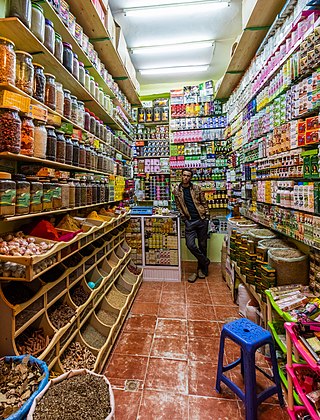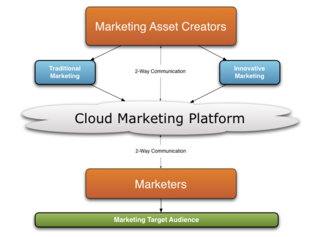
Retail is the sale of goods and services to consumers, in contrast to wholesaling, which is sale to business or institutional customers. A retailer purchases goods in large quantities from manufacturers, directly or through a wholesaler, and then sells in smaller quantities to consumers for a profit. Retailers are the final link in the supply chain from producers to consumers.
An experience economy is the sale of memorable experiences to customers. The term was first used in a 1998 article by B. Joseph Pine II and James H. Gilmore describing the next economy following the agrarian economy, the industrial economy, and the most recent service economy.

A gift card, also known as a gift certificate in North America, or gift voucher or gift token in the UK, is a prepaid stored-value money card, usually issued by a retailer or bank, to be used as an alternative to cash for purchases within a particular store or related businesses. Gift cards are also given out by employers or organizations as rewards or gifts. They may also be distributed by retailers and marketers as part of a promotion strategy, to entice the recipient to come in or return to the store, and at times such cards are called cash cards. Gift cards are generally redeemable only for purchases at the relevant retail premises and cannot be cashed out, and in some situations may be subject to an expiry date or fees. American Express, MasterCard, and Visa offer generic gift cards which need not be redeemed at particular stores, and which are widely used for cashback marketing strategies. A feature of these cards is that they are generally anonymous and are disposed of when the stored value on a card is exhausted.

Online shopping is a form of electronic commerce which allows consumers to directly buy goods or services from a seller over the Internet using a web browser or a mobile app. Consumers find a product of interest by visiting the website of the retailer directly or by searching among alternative vendors using a shopping search engine, which displays the same product's availability and pricing at different e-retailers. As of 2020, customers can shop online using a range of different computers and devices, including desktop computers, laptops, tablet computers and smartphones.

RedBalloon is an experiential gifts company.
Customer satisfaction is a term frequently used in marketing to evaluate customer experience. It is a measure of how products and services supplied by a company meet or surpass customer expectation. Customer satisfaction is defined as "the number of customers, or percentage of total customers, whose reported experience with a firm, its products, or its services (ratings) exceeds specified satisfaction goals." Enhancing customer satisfaction and fostering customer loyalty are pivotal for businesses, given the significant importance of improving the balance between customer attitudes before and after the consumption process.
Bernd Herbert Schmitt is a professor of international business in the marketing department at Columbia Business School, Columbia University in New York. He is known for his research and books, as well as speaking and consulting on customer experience, customer happiness, branding, innovation. He is noted for his work in Asia on Asian markets and consumers. He wrote several influential books in these areas like Experiential Marketing, Customer Experience Management, Big Think Strategy and Happy Customers Everywhere.
Engagement marketing, sometimes called "experiential marketing", "Brand Activation", "on-ground marketing", "live marketing", "participation marketing", "Loyalty Marketing", or "special events", is a marketing strategy that directly engages consumers and invites and encourages them to participate in the evolution of a brand or a brand experience. Rather than looking at consumers as passive receivers of messages, engagement marketers believe that consumers should be actively involved in the production and co-creation of marketing programs, developing a relationship with the brand.

Alpro is a European company based in Ghent, Belgium, that markets organic and non-organic, non-genetically modified, plant-based products, such as foods and drinks made from soy, almonds, hazelnuts, cashew, rice, oats or coconut. Alpro employs over 1,200 people in Europe and has three production facilities in Belgium, France and the United Kingdom. Alpro markets its products in Europe and beyond with the majority of its business in Europe.
"Youth Marketing" is a term used in the marketing and advertising industry to describe activities to communicate with young people, typically in the age range of 11 to 35. More specifically, there is teen marketing, targeting people age 11 to 17, college marketing, targeting college-age consumers, typically ages 18 to 24, and young adult marketing, targeting ages 25 to 34.
A touchpoint can be defined as any way consumers can interact with a business organization, whether person-to-person, through a website, an app or any form of communication. When consumers connect with these touchpoints they can consider their perceptions of the business and form an opinion.
An incentive program is a formal scheme used to promote or encourage specific actions or behavior by a specific group of people during a defined period of time. Incentive programs are particularly used in business management to motivate employees and in sales to attract and retain customers. Scientific literature also refers to this concept as pay for performance.
Consumer Cellular, Inc. is an American postpaid mobile virtual network operator founded by John Marick and Greg Pryor in Portland, Oregon in October 1995. The company offers cellphones, no-contract cellphone plans, and accessories with a focus on users over age 50. Including its corporate headquarters in Scottsdale, Arizona, Consumer Cellular is completely U.S. based, employing more than 3,100 people in Arizona, Oregon, Oklahoma, Kentucky and Texas.

Markus Giesler is a consumer sociologist and Professor of Marketing at the Schulich School of Business at York University. His research examines how ideas and things such as products, services, experiences, technologies, brands, and intellectual property acquire value over time, technology consumption, moral consumption, and the role of multiple stakeholders in the market creation process. Before doing his PhD in marketing, Giesler spent ten years operating his own record label and recording business in Germany. In 2014, he was named "one of the most outstanding business school professors under 40 in the world." Giesler is also the creator of the "Big Design" blog, which develops a sociological perspective on marketing, market creation, and customer experience design.
Experiential travel, also known as immersion travel, is a form of tourism in which people focus on experiencing a country, city or particular place by actively and meaningfully engaging with its history, people, culture, food and environment. It can often be transformative. Therewith the concept is based on very similar mechanisms as for example experiential education, experiential knowledge, experiential interior design, and experiential marketing.

Cloud marketing is the process of an organization's efforts to market their goods and services online through integrated digital experiences, by which they are specialized for every end-user. It aims to use advertising methods to give tailor made adverts to customers based on their browsing history or interests via online applications through social media websites such as Facebook, Twitter and various online portals. Cloud marketing platforms could be supported by third party providers that maintain the platform.
CardCash is an American company headquartered in Brick, New Jersey, that operates an online gift card marketplace where users can buy and sell discounted gift cards. It was co-founded in 2009 by CEO Elliot Bohm and COO Marc Ackerman.
Massification is a strategy that some luxury companies use to expose their brands to a broader market and increase sales. As a method of implementing massification, companies have created diffusion lines. Diffusion lines are an offshoot of a company or a designer's original line that is less expensive in order to reach a broader market and gain a wider consumer base. Another strategy used in massification is brand extensions, which is when an already established company releases a new product under their name.
Immersive commerce is an extension of e-commerce that focuses on improving customer experience by using augmented reality, virtual reality and immersive technology to create virtual smart stores from existing brick and mortar locations.
Prodege, LLC is an American online marketing, consumer polling, and market research company based in El Segundo, California. The company develops consumer rewards and polling programs under various brands including Swagbucks, MyPoints, InboxDollars, CouponCause, Tada, Ysense, Upromise, and Pollfish.






